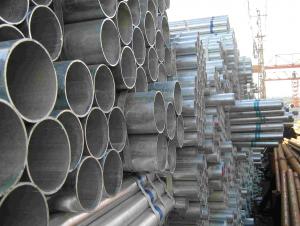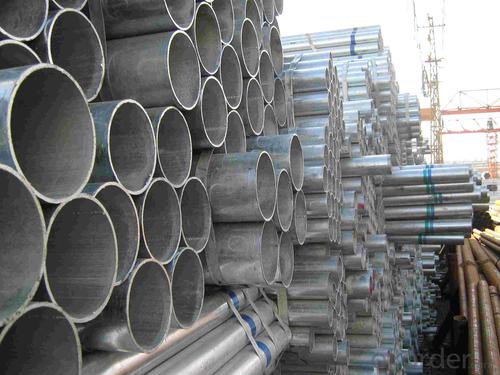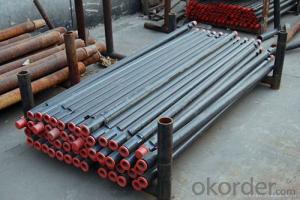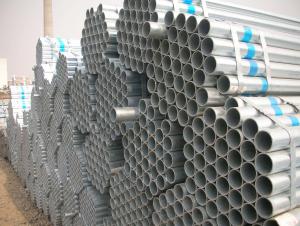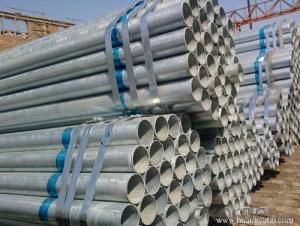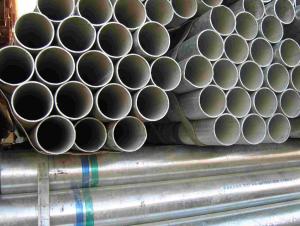Galvanized Pipe America Standard A53 200g Hot Dipped or Pre-galvanized Pipe
- Loading Port:
- Tianjin
- Payment Terms:
- TT or LC
- Min Order Qty:
- 55 m.t.
- Supply Capability:
- 8000 m.t./month
OKorder Service Pledge
OKorder Financial Service
You Might Also Like
1、Structure of Galvanized Pipe America Standard A53 200g Hot Dipped or Pre-galvanized Pipe:
The surface of Galvanized Pipe America Standard A53 200g Hot Dipped or Pre-galvanized Pipecan increase the corrosion resistance of the steel tube, prolong service life. Galvanized pipe is widely used, in addition to water, gas, oil and other general low pressure fluid pipelines. It is also used in the petroleum industry, especially for offshore oil field of oil well pipe and oil pipe, chemical, coking equipment of oil heater, condensation cooler, coal run oil exchanger tube, and trestle pile, the mine tunnel support frame tube.
2、Main Features of Galvanized Pipe America Standard A53 200g Hot Dipped or Pre-galvanized Pipe:
• High manufacturing accuracy with standard
• High strength and stable
• Good visual effect
• Reasonable price
• Small inertia resistance
• Strong heat dissipation ability
3、Galvanized Pipe America Standard A53 200g Hot Dipped or Pre-galvanized Pipe Specification:
Standard | GB, DIN, ASTM ASTM A106-2006, ASTM A53-2007 |
Grade | 10#-45#, 16Mn 10#, 20#, 45#, 16Mn |
Thickness | 1 - 33 mm |
Section Shape | Round |
Outer Diameter | 21 - 610mm |
Place of Origin | Tianjin, China (Mainland) |
Secondary Or Not | Non-secondary |
Application | Hydraulic Pipe |
Technique | Cold Drawn |
Certification | API |
Surface Treatment | factory state or painted black |
Special Pipe | API Pipe |
Alloy Or Not | Non-alloy |
Length | 5-12M |
Outer Diameter | 21.3-610mm |
Grade | 20#, 45#, Q345, API J55, API K55, API L80, API N80, API P110, A53B |
Standard | ASME, ASTM |
1) Material:20#(ASTM A 106/A53 GRB.API5LGRB,GB),45#,16Mn,10#.
2) Specification range:OD:21.3-610mm,WT:6-70mm,length:6-12m or according to the requirement of clients.
3) Excutive standards:GB,ASME API5L.ASTM A 106/A53,Despite of the above standards,we can also supply seamless steel pipe with standard of DIN,JIS,and so on,and also develop new products according to the requirements of our clients!
4) Surface:black lacquered,varnish coating or galvanized.
5) Ends:Beveled or square cut,plastic capped,painted.
6) Packing:bundles wrapped with strong steel strip,seaworthy packing.
4、Packaging & Delivery
Packaging Details: | seaworthy package,bundles wrapped with strong steel strip |
Delivery Detail: | 15-30days after received 30%TT |
5、FAQ of Galvanized Pipe America Standard A53 200g Hot Dipped or Pre-galvanized Pipe:
①How is the quality of your products?
Our products are manufactured strictly according to national and internaional standard, and we take a test
on every pipe before delivered out. If you want see our quality certifications and all kinds of testing report, please just ask us for it.
Guaranteed: If products’ quality don’t accord to discription as we give or the promise before you place order, we promise 100% refund.
②How about price?
Yes, we are factory and be able to give you lowest price below market one, and we have a policy that “ for saving time and absolutely honest business attitude, we quote as lowest as possible for any customer, and discount can be given according to quantity”,if you like bargain and factory price is not low enough as you think, just don’t waste your time.Please trust the quotation we would give you, it is professional one.
6、 Galvanized Pipe America Standard A53 200g Hot Dipped or Pre-galvanized Pipe: Images:
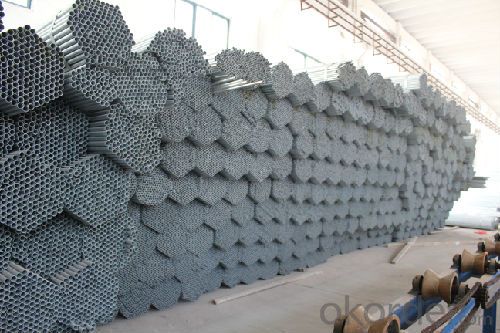

- Q: What are the different methods of pipe cutting for steel pipes?
- There are several methods of pipe cutting for steel pipes, each suited for different situations and requirements. Some of the most common methods include: 1. Manual Pipe Cutters: These handheld tools are commonly used for cutting smaller diameter steel pipes. They typically feature a cutting wheel that is rotated around the pipe, gradually creating a groove until the pipe is cut through. Manual pipe cutters are portable and relatively easy to use, making them suitable for on-site cutting tasks. 2. Hacksaw: Using a hacksaw is a traditional and cost-effective method for cutting steel pipes. This method requires physical effort and time, but it can be effective for cutting pipes with smaller diameters. It is important to use a fine-toothed blade and apply steady pressure to ensure a clean and precise cut. 3. Reciprocating Saw: Also known as a sawzall, a reciprocating saw is a power tool that uses a back-and-forth cutting motion to quickly and efficiently cut through steel pipes. These saws are versatile and can be used with different types of blades to handle different pipe sizes and thicknesses. 4. Band Saw: Band saws are commonly used in industrial settings for cutting large steel pipes. These saws feature a continuous loop of teethed metal blade that runs on wheels, allowing for precise and rapid cutting. Band saws are ideal for cutting large-diameter pipes and can be manually operated or fully automated for high-volume cutting tasks. 5. Pipe Cutting Machines: To achieve accurate and consistent cuts, pipe cutting machines are often used. These machines are designed to cut steel pipes with speed and precision, making them ideal for large-scale industrial applications. Depending on the specific machine and requirements, different cutting methods such as abrasive cutting, flame cutting, or plasma cutting can be employed. It is important to note that the choice of pipe cutting method depends on factors such as pipe diameter, thickness, location, precision requirements, and available resources. Proper safety precautions should always be followed when working with any cutting method to avoid injury or damage to the pipes.
- Q: What is the difference between steel pipes and PPR pipes?
- Steel pipes are made of a durable and strong material, steel, which makes them suitable for carrying high-pressure fluids and gases. On the other hand, PPR (polypropylene random copolymer) pipes are made of a plastic material, which makes them lightweight, corrosion-resistant, and easy to install. PPR pipes are commonly used for plumbing systems, while steel pipes are more commonly used for industrial applications and heavy-duty purposes.
- Q: How are steel pipes used in natural gas processing plants?
- Steel pipes are used in natural gas processing plants to transport and distribute the gas throughout the facility. They provide a reliable and durable infrastructure for the safe and efficient movement of gas from extraction to processing and distribution.
- Q: 304 stainless steel tube with the diameter of 25*2-3 is what mean
- The quality of the steel pipe should be in line with the national standard "stainless steel seamless pipe for fluid transportation" (GBT 14976-2012) requirements.
- Q: What is the outer diameter of the steel tube?
- The diameter of a steel pipe refers to the diameter of the steel pipe. The specifications of the steel tube is normal with diameter (diameter and thickness) said, for example 100MM outer diameter and wall thickness of 5MM tube is marked with 100*5.
- Q: What are the potential health hazards associated with steel pipe installation?
- Some potential health hazards associated with steel pipe installation include exposure to hazardous chemicals used in the coating or treatment of the pipes, inhalation of dust or fumes generated during cutting or welding, and physical injuries due to accidents or mishandling of heavy equipment. Additionally, improper handling or disposal of waste materials and contaminated water can pose environmental health risks. It is important to follow proper safety protocols, use personal protective equipment, and ensure proper ventilation and waste management to mitigate these hazards.
- Q: What is the role of steel pipes in the chemical manufacturing industry?
- Steel pipes play a crucial role in the chemical manufacturing industry as they are used for the transportation of various chemicals, both liquids and gases. The durability and resistance to corrosion of steel make it an ideal material for these pipes, ensuring the safe and efficient transfer of hazardous substances. Additionally, steel pipes are able to withstand high pressure and temperature conditions, allowing for the smooth operation of chemical processes.
- Q: Are steel pipes suitable for use in nuclear power plants?
- Yes, steel pipes are suitable for use in nuclear power plants. They are commonly used in various systems such as cooling, steam, and reactor coolant systems due to their high strength, durability, and resistance to corrosion. Additionally, steel pipes can withstand the high pressure and temperature conditions present in nuclear power plants, making them a reliable choice for this critical infrastructure.
- Q: What are the different methods of wrapping steel pipes for corrosion protection?
- Corrosion protection for steel pipes can be achieved through various methods, tailored to specific applications and environmental conditions. Some commonly used techniques include: 1. Tape Wrapping: Steel pipes are wrapped with corrosion-resistant tape, like polyethylene or polypropylene tape, to create a barrier between the pipe and corrosive elements. This reduces the risk of direct contact and subsequent corrosion. 2. Inner Wrapping: A protective coating or lining is applied to the inside surface of the steel pipe. This method is commonly employed for pipes transporting fluids or gases, offering an additional layer of protection against internal corrosion. 3. External Coating: A widely utilized technique involves applying a protective coating to the outer surface of the steel pipe. This coating, which can consist of materials like epoxy, polyethylene, or polyurethane, acts as a barrier against corrosive elements, extending the pipe's lifespan. 4. Cathodic Protection: An electrochemical method is utilized to safeguard steel pipes from corrosion. By connecting the steel pipe to a sacrificial anode, such as zinc or magnesium, the anode corrodes instead of the pipe. This diverts corrosive currents away from the pipe, preventing its corrosion. 5. Heat Shrink Sleeve: Heat shrink sleeves are commonly employed for corrosion protection in underground or submerged scenarios. These sleeves, made of heat-activated material, shrink when heated to form a tight seal around the pipe. By preventing direct contact with moisture and corrosive elements, the sleeve effectively acts as a barrier. 6. Fusion Bonded Epoxy (FBE) Coating: FBE coating entails applying a thermosetting powder coating to the steel pipe's surface, which then fuses to create a protective layer. This coating exhibits strong adhesion and corrosion resistance, making it a popular choice for various steel pipe applications. Choosing the appropriate corrosion protection method for steel pipes depends on factors like the environment, specific corrosive elements, intended use, and other requirements. Seeking professional advice and consultation may be necessary to determine the most suitable technique for a particular situation.
- Q: How are steel pipes used in the chemical processing industry?
- Steel pipes are used extensively in the chemical processing industry as they offer superior strength, durability, and resistance to corrosion. These pipes are used to transport various chemicals, including acids, alkalis, and solvents, throughout the processing plants. They are also utilized for conveying gases, steam, and liquids under high pressure and temperature conditions. Furthermore, steel pipes are employed in the construction of chemical reactors, heat exchangers, and storage tanks, ensuring the safe and efficient operation of chemical processes.
Send your message to us
Galvanized Pipe America Standard A53 200g Hot Dipped or Pre-galvanized Pipe
- Loading Port:
- Tianjin
- Payment Terms:
- TT or LC
- Min Order Qty:
- 55 m.t.
- Supply Capability:
- 8000 m.t./month
OKorder Service Pledge
OKorder Financial Service
Similar products
Hot products
Hot Searches
Related keywords
